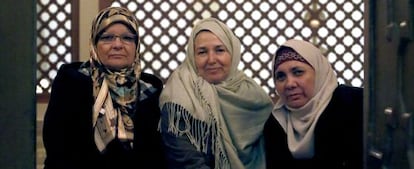Spanish pilgrims of Muslim charity
Three women explain how they were able to travel into the heart of Islam All thanks to a little help from the United Arab Emirates


Three women fulfill their obligations as Muslims, passing seven times around the Kaaba, the most sacred symbol of Islam, inside the Grand Mosque in Mecca. But their names are not Laila or Fatima or Aisha, just as their native tongue is not Arabic.
They are María Antonia, Ángeles and Consuelo, three Spaniards who converted to Islam and traveled to the holy city with help from the Embassy of the United Arab Emirates, which each year pays for travel and lodging expenses (around 4,000 euros) for several people like this group of women.
In October, a group of 15 Muslim Spaniards from Madrid, Granada and Córdoba performed Hajj in Saudi Arabia on the invitation of a foundation from the UAE. "The trip was a gift from God," says Ángeles Crespo, a 49-year-old former school teacher from Madrid.
"It was an adventure, an experience and an emotional feeling," adds Consuelo, 51, who is from Zamora.
These are very expensive trips that you cannot easily afford"
"It helped us learn a lot about the history of this religion and we were able to visit the holy places," says María Antonia García, 56, from Extremadura. All three women are back in Spain, wearing their veils, as they recount their journey near the women's oratory at Madrid's Central Mosque. But their journey really began with their own conversion to Islam.
García was a Christian who married a Palestinian man, with whom she had five children. "When they were born, I began wondering which of the two religions we had at home would bring more to my children," she says. "They started going to Islamic religion school, and I would go with them, and I slowly began to be interested. I realized that I felt really good about it, and I started going deeper into it." That was over 20 years ago.
Consuelo, who married an Arabic man over two decades ago, has a similar story to tell. "I used to be a Christian, but a lot of things didn't make sense, while Islam made complete sense to me," she says.
For Crespo, conversion from her initial agnosticism was more recent: "Three years ago I began a relationship with a Moroccan person, and at the same time I began reading books on Islam. I was suffering from depression at the time, but ever since I came into contact with this religion I have found great peace."
21,000 converts
There are 1,732,000 Muslims in Spain, of which 1,163,000 are foreign nationals mainly from Morocco and Algeria, as well as other Arab countries. There are also 568,000 Spaniards who profess the faith of Islam, which includes foreigners who were nationalized Spanish, the children of mixed couples and native Spanish converts (21,000), according to the latest data from December 2013 provided by the Union of Islamic Communities of Spain.
The pilgrimage to Mecca is one of the five pillars of Islam, along with fasting at Ramadan, charity, prayers and the declaration of faith in God and the prophet Mohammed. The pilgrimage is by far the hardest mandate to follow because of the high expense it entails and because Saudi Arabia sets country quotas based on their Muslim population, to prevent overcrowding.
In 2013, the number of pilgrims fell 20 percent from the previous year because of renovation work at the Grand Mosque, and only 1.5 million foreigners were allowed in, according to EL PAÍS Middle East correspondent Ángeles Espinosa. The Saudi Embassy says 1,500 travel visas were issued last year for the Mecca pilgrimage from Spain, compared with 1,700 the year before.
Charity groups and wealthy individuals often sponsor the journey for those who cannot afford it. The faithful say that paying for someone else's pilgrimage is "like giving him a blessing." In the Spanish exclaves of Ceuta and Melilla in North Africa, with their large Muslim populations, elderly people fulfill their religious obligations each year thanks to these generous gifts.
Meanwhile, the oil states of the Gulf have started programs that focus on converts, as a way to extend Islam in areas with a Christian majority. Mohammed Aldel Kawy, of the economic department at the United Arab Emirates Embassy, explains that the program that María Antonia, Ángeles and Consuelo benefited from has been operational for three years and is funded by the Zayed Bin Sultan Al Nahyan and Khalifa Bin Zayed Al Nahyan associations. "It is a gift from the country's president, awarded annually, although there are also private associations and individuals who contribute money to help people without means make the pilgrimage."
A girl took my hand and started to say the prayer slowly so I could repeat it"
The embassy announces the offer of such grants at mosques, and each year it receives around 500 applications. The 15 Spanish pilgrims who were chosen this year - the highest number to date - were picked at random. "I was at work - at an export company - when I received a message from the embassy telling me to call them if I was interested in making the pilgrimage," explains García.
The main requirements for application are being a convert to Islam, over 40 years old and a low-income earner. The first requirement can be proven with a certificate from the imam of any mosque. As for the applicant's exact financial situation, this is not checked.
But all of these three women swear that they would not have been able to afford the 4,000 euros without assistance. "I have a son who is studying and right now that is my priority. These are very expensive trips that you cannot easily afford," says García.
The 15 Spanish converts traveled with an organized group that included 35 native Muslims - mostly Moroccans who live in Spain - who paid their own way. The travel package included food, guides and even the sacrifice of a lamb, which every Muslim must partake in after the month of pilgrimage.
The journey lasted 24 days, from October 2 to 26. The group from Spain first landed in Jordan, where they visited the Dead Sea. After that they went to Medina and Mecca, two cities located in the Hijaz region of Saudi Arabia.
"I was surprised at how well organized everything is," says Crespo. "Arabs are very respectful, and as soon as we said we were Spanish, they were very kind to us," adds Consuelo. "This is contrary to the bad image that some Spaniards have of them."
García explains that despite the cultural and linguistic differences, they had no communication problems throughout the trip. "On the one hand we had a guide, but besides that there is a great spirit of brotherhood with the entire world; people understand each other even if it is through gestures, whether they're Africans, Arabs, Indonesians..."
"I was at the Grand Mosque, near the Kaaba, when we had to say a prayer in Arabic. My mind went blank for an instant and I was unable to remember what I had to say. An African girl took me by the hand and started to say the sentences slowly so I could repeat them. It was a beautiful moment," she adds.
Consuelo, María Antonia and Ángeles' experience is out of reach for most Spaniards: it is not possible to visit Saudi Arabia unless one is a Muslim, since there are no tourist visas. Authorities there have repeatedly said they are going to change that, but so far nothing has materialized. "I suppose we were very lucky - it is a gift from Allah," smiles Crespo.
Meanwhile, the UAE Embassy notes that any Spanish Muslim may sign up for next year's draw.
Tu suscripción se está usando en otro dispositivo
¿Quieres añadir otro usuario a tu suscripción?
Si continúas leyendo en este dispositivo, no se podrá leer en el otro.
FlechaTu suscripción se está usando en otro dispositivo y solo puedes acceder a EL PAÍS desde un dispositivo a la vez.
Si quieres compartir tu cuenta, cambia tu suscripción a la modalidad Premium, así podrás añadir otro usuario. Cada uno accederá con su propia cuenta de email, lo que os permitirá personalizar vuestra experiencia en EL PAÍS.
¿Tienes una suscripción de empresa? Accede aquí para contratar más cuentas.
En el caso de no saber quién está usando tu cuenta, te recomendamos cambiar tu contraseña aquí.
Si decides continuar compartiendo tu cuenta, este mensaje se mostrará en tu dispositivo y en el de la otra persona que está usando tu cuenta de forma indefinida, afectando a tu experiencia de lectura. Puedes consultar aquí los términos y condiciones de la suscripción digital.